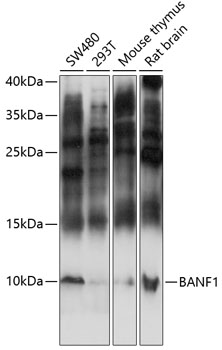Immunology Antibodies 1
Anti-BANF1 Antibody (CAB14555)
- SKU:
- CAB14555
- Product Type:
- Antibody
- Reactivity:
- Human
- Reactivity:
- Mouse
- Reactivity:
- Rat
- Host Species:
- Rabbit
- Isotype:
- IgG
- Antibody Type:
- Polyclonal Antibody
- Research Area:
- Immunology
Description
| Antibody Name: | Anti-BANF1 Antibody |
| Antibody SKU: | CAB14555 |
| Antibody Size: | 20uL, 50uL, 100uL |
| Application: | WB IHC |
| Reactivity: | Human, Mouse, Rat |
| Host Species: | Rabbit |
| Immunogen: | A synthetic peptide corresponding to a sequence within amino acids 1-89 of human BANF1 (NP_001137457.1). |
| Application: | WB IHC |
| Recommended Dilution: | WB 1:500 - 1:2000 IHC 1:50 - 1:100 |
| Reactivity: | Human, Mouse, Rat |
| Positive Samples: | SW480, 293T, Mouse thymus, Rat brain |
| Immunogen: | A synthetic peptide corresponding to a sequence within amino acids 1-89 of human BANF1 (NP_001137457.1). |
| Purification Method: | Affinity purification |
| Storage Buffer: | Store at -20'C. Avoid freeze / thaw cycles. Buffer: PBS with 0.02% sodium azide, 50% glycerol, pH7.3. |
| Isotype: | IgG |
| Sequence: | MTTS QKHR DFVA EPMG EKPV GSLA GIGE VLGK KLEE RGFD KAYV VLGQ FLVL KKDE DLFR EWLK DTCG ANAK QSRD CFGC LREW CDAF L |
| Gene ID: | 8815 |
| Uniprot: | O75531 |
| Cellular Location: | Chromosome, Cytoplasm, Nucleus |
| Calculated MW: | 10kDa |
| Observed MW: | 10kDa |
| Synonyms: | BANF1, BAF, BCRP1, D14S1460, NGPS |
| Background: | The protein encoded by this gene was first identified by its ability to protect retroviruses from intramolecular integration and therefore promote intermolecular integration into the host cell genome. The protein forms a homodimer which localizes to both the nucleus and cytoplasm and is specifically associated with chromosomes during mitosis. This protein binds to double stranded DNA in a non-specific manner and also binds to LEM-domain containing proteins of the nuclear envelope. This protein is thought to facilitate nuclear reassembly by binding with both DNA and inner nuclear membrane proteins and thereby recruit chromatin to the nuclear periphery. Alternative splicing results in multiple transcript variants encoding the same protein. |
| UniProt Protein Function: | BAF: Plays fundamental roles in nuclear assembly, chromatin organization, gene expression and gonad development. May potently compress chromatin structure and be involved in membrane recruitment and chromatin decondensation during nuclear assembly. Contains 2 non-specific dsDNA-binding sites which may promote DNA cross-bridging. Exploited by retroviruses for inhibiting self- destructing autointegration of retroviral DNA, thereby promoting integration of viral DNA into the host chromosome. EMD and BAF are cooperative cofactors of HIV-1 infection. Association of EMD with the viral DNA requires the presence of BAF and viral integrase. The association of viral DNA with chromatin requires the presence of BAF and EMD. Defects in BANF1 are the cause of Nestor-Guillermo progeria syndrome (NGPS). NGPS is an atypical progeroid syndrome characterized by normal development in the first years of life, later followed by the emergence of generalized lipoatrophy, severe osteoporosis, and marked osteolysis. The atrophic facial subcutaneous fat pad and the marked osteolysis of the maxilla and mandible result in a typical pseudosenile facial appearance with micrognatia, prominent subcutaneous venous patterning, a convex nasal ridge, and proptosis. Cognitive development is completely normal. Patients do not have cardiovascular dysfunction, atherosclerosis, or metabolic anomalies. Belongs to the BAF family. |
| UniProt Protein Details: | Protein type:DNA-binding Chromosomal Location of Human Ortholog: 11q13.1 Cellular Component: cytoplasm; cytosol; nucleoplasm; nucleus Molecular Function:protein binding Biological Process: mitotic nuclear envelope disassembly; mitotic nuclear envelope reassembly; nuclear transport; response to virus Disease: Nestor-guillermo Progeria Syndrome |
| NCBI Summary: | The protein encoded by this gene was first identified by its ability to protect retroviruses from intramolecular integration and therefore promote intermolecular integration into the host cell genome. The protein forms a homodimer which localizes to both the nucleus and cytoplasm and is specifically associated with chromosomes during mitosis. This protein binds to double stranded DNA in a non-specific manner and also binds to LEM-domain containing proteins of the nuclear envelope. This protein is thought to facilitate nuclear reassembly by binding with both DNA and inner nuclear membrane proteins and thereby recruit chromatin to the nuclear periphery. Alternative splicing results in multiple transcript variants encoding the same protein.[provided by RefSeq, Jan 2009] |
| UniProt Code: | O75531 |
| NCBI GenInfo Identifier: | 5921173 |
| NCBI Gene ID: | 8815 |
| NCBI Accession: | O75531.1 |
| UniProt Secondary Accession: | O75531,O60558, Q6FGG7, |
| UniProt Related Accession: | O75531 |
| Molecular Weight: | 10,059 Da |
| NCBI Full Name: | Barrier-to-autointegration factor |
| NCBI Synonym Full Names: | barrier to autointegration factor 1 |
| NCBI Official Symbol: | BANF1 |
| NCBI Official Synonym Symbols: | BAF; NGPS; BCRP1; D14S1460 |
| NCBI Protein Information: | barrier-to-autointegration factor |
| UniProt Protein Name: | Barrier-to-autointegration factor |
| UniProt Synonym Protein Names: | Breakpoint cluster region protein 1 |
| Protein Family: | Barrier-to-autointegration factor |
| UniProt Gene Name: | BANF1 |
| UniProt Entry Name: | BAF_HUMAN |
View AllClose







